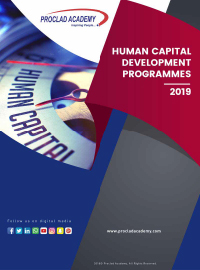Compensation & Benefits Administration: Managing Employee Motivation, Performance & Rewards
| Ref No. | Dates | Venue | Fee (US$) | |
|---|---|---|---|---|
| HR 009 | 06 - 10 Apr 2020 | Istanbul | 5000 | Register |
| HR 009 | 23 - 27 Aug 2020 | Dubai | 4500 | Register |
| HR 009 | 20 - 24 Dec 2020 | Dubai | 4500 | Register |
Compensation & Benefits Administration: Managing Employee Motivation, Performance & Rewards
Introduction
In order to recruit and retain high caliber employees, an organisation needs to provide a package for employee compensation which is attractive, appropriate and affordable. Such packages have to not only be attractive externally, they have to be fair internally - this means a remuneration structure based also on internal job classifications. Furthermore the retention and motivation of high caliber employees is not as simple as paying well. The design of compensation packages has to take into account the aspirations of employees for personal development and promotion.
PROCLAD Academy’s Compensation & Benefits Administration: Managing Employee Motivation, Performance & Rewards training course will cover the question of how processes can be managed to deal with employee motivation; performance management; extrinsic and Intrinsic reward; the maintenance of standards through the management of employee conduct; job evaluation; short term and long term incentives; the importance of the first line supervisor or team leader; the use of competencies; personal development; career planning and promotion.
The key features of PROCLAD Academy’s Compensation & Benefits Administration: Managing Employee Motivation, Performance & Rewards training course are:
- Working with People
- Relating and Networking
- Presenting and Communicating
- Formulating Concepts and Strategies
- Following Instructions and Procedures
Learning Objectives
Attendance to PROCLAD Academy’s Compensation & Benefits Administration: Managing Employee Motivation, Performance & Rewards training course will enable the participants to:
- Describe the main influences over employee motivation
- Realise the value of an empowered approach
- Implement effective compensation and reward strategies
- Improve confidence in dealing with compensation and reward issues
- Understand the principles behind job evaluation schemes
- Link salary structure to job evaluation
- Know how to apply latest thinking to performance management practices
- Match performance evaluation to salary structure
- Design incentive schemes consistent with corporate strategy
- Develop professional standards for measuring and assessing employees for promotion
- Apply best practice in comparing internal and external relativities
Target Audience
PROCLAD Academy’s Compensation & Benefits Administration: Managing Employee Motivation, Performance & Rewards training course is suitable to a wide range of professionals but will greatly benefit:
- HR staff who are responsible for managing benefits and reward
- HR practitioners working with Compensation packages
- Professionals and supervisors responsible for compensation and benefits
- Those who are responsible for managing and motivating staff, and need a better understanding of how to manage remuneration
- All staff who work in Human Resources, Personnel or related areas and personnel new to HR or interested in a career in HR
- Those who manage, supervise or have an organisational interest in HR and want to examine modern practices
Training Methodology
The methodology used in PROCLAD Academy’s Compensation & Benefits Administration: Managing Employee Motivation, Performance & Rewards training course is designed to encourage maximum participation by all delegates. Participants will be encouraged to test out the ideas by the use of discussion, small group work, exercises and feedback. Each day of the training course will end by delegates completing their own record of what has been learned on the day and considering how the ideas might be transferred back to the workplace.
Course Outline
- Introduction — the context compensation & rewards
- Talent Management
- Reward systems as a method of communication
- The concept of total reward
- Models of total reward
- Job Analysis
- Job Evaluation
- Matching the outcome to salary scales
- External comparison – quartile policy
- Broadbanding
- Red circling and green circling
- Merit pay and Incremental schemes
- Conditions of employment (holidays, sick pay, retirement, security of employment, allowances, etc.)
- Short term incentives
- Long term incentives
- Flexible conditions
- Physical conditions
- The four components
- The links to values and culture
- Management of conduct
- Employee motivation
- Empowerment and recognition
- The use of competencies
- Succession planning
- The performance/potential matrix
- Personal development
- The use of assessment centres


